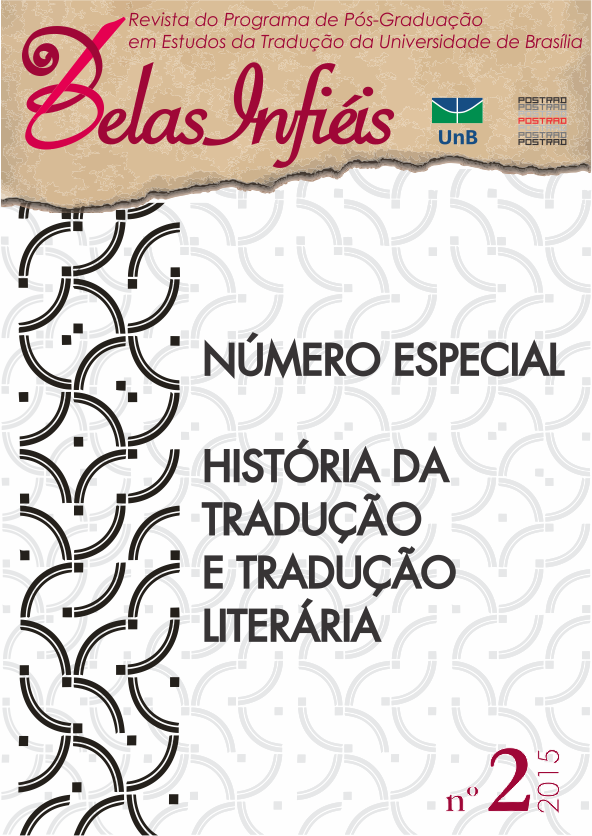DIFICULDADES NA TRADUÇÃO LITERÁRIA JAPONÊS-PORTUGUÊS
DOI :
https://doi.org/10.26512/belasinfieis.v4.n2.2015.11337Mots-clés :
Tradução, Língua Japonesa, Literatura JaponesaRésumé
O presente trabalho tem por objetivo analisar dificuldades peculiares à tradução direta do japonês para o português, mais especificamente no que diz respeito ao texto literário. Serão destacados alguns aspectos no que tende a ser considerado como de difícil tradução para a língua portuguesa (onomatopeias, expressões de tratamento, verbos compostos), sendo tais aspectos ilustrados através de excertos de duas obras da literatura japonesa já traduzidas e publicadas para o português: Rashômon, de Akutagawa Ryûnosuke, traduzida em “Rashômon e outros contos” por Marilena Hashimoto Cordaro e Junko Ota, e Wagahai wa neko de aru, de Natsume Sôseki, traduzida como “Eu sou um gato” por Jefferson José Teixeira.
Téléchargements
Références
AKUTAGAWA. Ryûnosuke,Rashômon e outros contos. Trad. do japonês Marilena Hashimoto Cordaro e Junko Ota. São Paulo: Hedra, 2008.
_______. Rashômon.Disponível em: <http://www.aozora.gr.jp/cards/000879/ files/127_15260.html> Acesso em 03 set.2014.
JANEIRA, A. M. O impacto português sobre a civilização japonesa. Lisboa: Publicações Dom Quixote, 1988.
KONDO, M. Multiple Layers of Meaning”“Toward a Deepening of the ‘Sense’ Theory of Interpreting.Interpretation Studies, n. 6, p. 175-182, 2006.
NATSUME.Soseki,Eu sou um gato. Trad. do japonês e notas Jefferson José Teixeira. 2. ed. São Paulo: Estação Liberdade, 2008.
____. Wagahai wa neko de aru. Disponível em: < http://www.aozora.gr.jp/cards/000148/ files/789_14547.html > Acesso em 02 out.2014.
MORALES, L.M. (Org.). Tópicos de gramática da língua japonesa.São Paulo: Fundação Japão, 2011.
SEIDENSTICKER, E. On trying to translate Japanese. In: BIGUENET, J.; SCHULTE, R.(Ed.). The craft of translation.Chicago: The University of Chicago Press, 1989. p. 142-153.
YOSHIDA, Luiza Nana. Literatura Japonesa ”“Desafios e perspectivas. In: Anais do XVI Encontro Nacional de Professores Universitários de Língua, Literatura e Cultura Japonesa e III Congresso Internacional de Estudos Japoneses no Brasil: Brasilia-DF: Departamento de Línguas Estrangeiras e Tradução, 2005, p. 273-279.
Téléchargements
Publié-e
Comment citer
Numéro
Rubrique
Licence
Copyright Statement
Given the public access to this journal, the texts are free to use but requires the recognition of the original authorship and initial publication in this journal to be properly stated.
The journal allows the use of works published for non-commercial purposes, including the right to submit the work to publicly accessible databases. Published contributions are the sole and exclusive responsibility of the author(s).
- When submitting papers to be evaluated by the Belas Infiéis journal, the author(s):
- Declare that the contents of the contributions are original and of their original creation, being entirely responsible for their content if there is an objection by third parties.
- Claim to be aware that they should not commit academic plagiarism.
- Declare that the manuscript has not been published, completely or partially, in Portuguese or another language. If it is a translation it should be submitted to the Translated Articles section.
- Declare that the manuscript is not being evaluated by other journals.
- Declare that the manuscript was not submitted to another journal simultaneously.
- Commit(s) to inform the journal of any kind of error or inaccuracy in their contribution (published, in evaluation or in editing) and to collaborate with the editors to make due corrections of the article (when in evaluation or editing) or erratum/retraction (after publication).
- Declare that there is no conflict of interest regarding the published work.
- Authorize its release if it is accepted for publication without any kind of monetary compensation.
- Agree to assign non-exclusive rights to publication to the magazine, remaining free to make their contribution available in other media as long as the publication of the first version in Belas Infiéis magazine is mentioned. They also authorize Belas Infiéis to assign their texts for reproduction in content indexers, virtual libraries and similar platforms.
- Maintain copyright and grant the journal the right of first publication, the work being licensed under theCreative Commons Attribution License.
- Is/Are allowed and encouraged to publish and distribute their work online after the editorial process, which may increase the impact and citation of the published work.
- Authorize the editorial team to make textual adjustments and to adapt the article to the publication rules, when necessary.



















